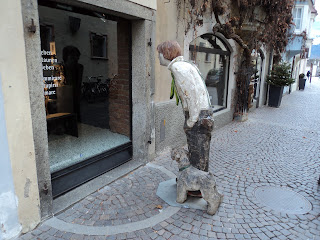 This past weekend, little Daire turned three years old and had a most stylish party where only the poshest of Berlin's babies were in attendance. About 15 of these trendsetters and their parents came to dine on delicacies such as gummy bears, cake, and ice cream, while drinking only the finest apple juice. Daire was excited all week for his party and every day one of the first things he would say when I picked him up from preschool would be to remind me that he wanted a chocolate cake for his party. The proud parents even brought in a renowned party decorator all the way from America to festively yet tastefully ornament the apartment with streamers. The children were mostly boys, and entertained themselves with Daire's prized collection of planes, trains, and automobiles. Their parents enjoyed the chance to converse with other grown-ups on a Saturday and tried to avoid being trampled in the sugar-powered chaos that transformed the neatly kept apartment into something resembling a post-apocalyptic wasteland.
This past weekend, little Daire turned three years old and had a most stylish party where only the poshest of Berlin's babies were in attendance. About 15 of these trendsetters and their parents came to dine on delicacies such as gummy bears, cake, and ice cream, while drinking only the finest apple juice. Daire was excited all week for his party and every day one of the first things he would say when I picked him up from preschool would be to remind me that he wanted a chocolate cake for his party. The proud parents even brought in a renowned party decorator all the way from America to festively yet tastefully ornament the apartment with streamers. The children were mostly boys, and entertained themselves with Daire's prized collection of planes, trains, and automobiles. Their parents enjoyed the chance to converse with other grown-ups on a Saturday and tried to avoid being trampled in the sugar-powered chaos that transformed the neatly kept apartment into something resembling a post-apocalyptic wasteland.Of course, live entertainment was provided; Wolfram was a master of puppet theater before settling down to work in the Foreign Ministry, so the children are able to enjoy his hidden talents at their birthday parties. The show for Daire was about the frog-prince's birthday party: the main character, a boy, is going to bring a cake baked by his grandmother as a gift, but the mean crocodile takes it and eats it. He finds the crocodile and brings it to face the judgement of the frog-prince. The crocodile brings a flower to apologize, and explains that he stole and ate the cake because he was sad that he was not invited to the party. He is forgiven by the frog-prince who apologizes for not inviting him and is allowed to attend the party. Apparently this years production was a little more thrown together than last year's and borrowed some elements from last year, which had the Arab Spring as a theme. In that play the crocodile was unjustly ruling the town and the other characters rose against him. I asked Wolfram if it was appropriate to have a play for children which involved the bloody overthrow and execution of a despot, but apparently when the other puppets marched on the crocodile, he got scared and explained that he was mean because he didn't have any friends.
Daire received some lovely gifts for his birthday including cars and many books (which he also loves). However, the best gift of all was a real big-boy bike with pedals. Although at first intimidated by it, soon he was pedaling away and crashing into things with aplomb. A first bike is a classic gift and just in time for spring too.
Well that's about it from the land of the Germans, it hasn't been a terribly interesting month here, just a lot of staying inside, drinking beer and playing The Settlers of Catan with some friends (a German board game die Siedler von Catan). The most exciting thing to happen this month occurred earlier this week when I sat next to an old drunk who reaked of cigarettes on a crowded subway, who thought I was sitting too close to him and tried to pick a fight with me after calling me every name in the book. I just kept my calm and told him there was no problem, and sat their pleasantly next to him for the duration of the ride while he occasionally blew off steam about how young people don't respect anything. I figure his life must suck, I'll let him get it out of his system. I am sure to have more interesting things to report than the grumblings of bums as the city awakens from its hibernation, thanks for tuning in.



























